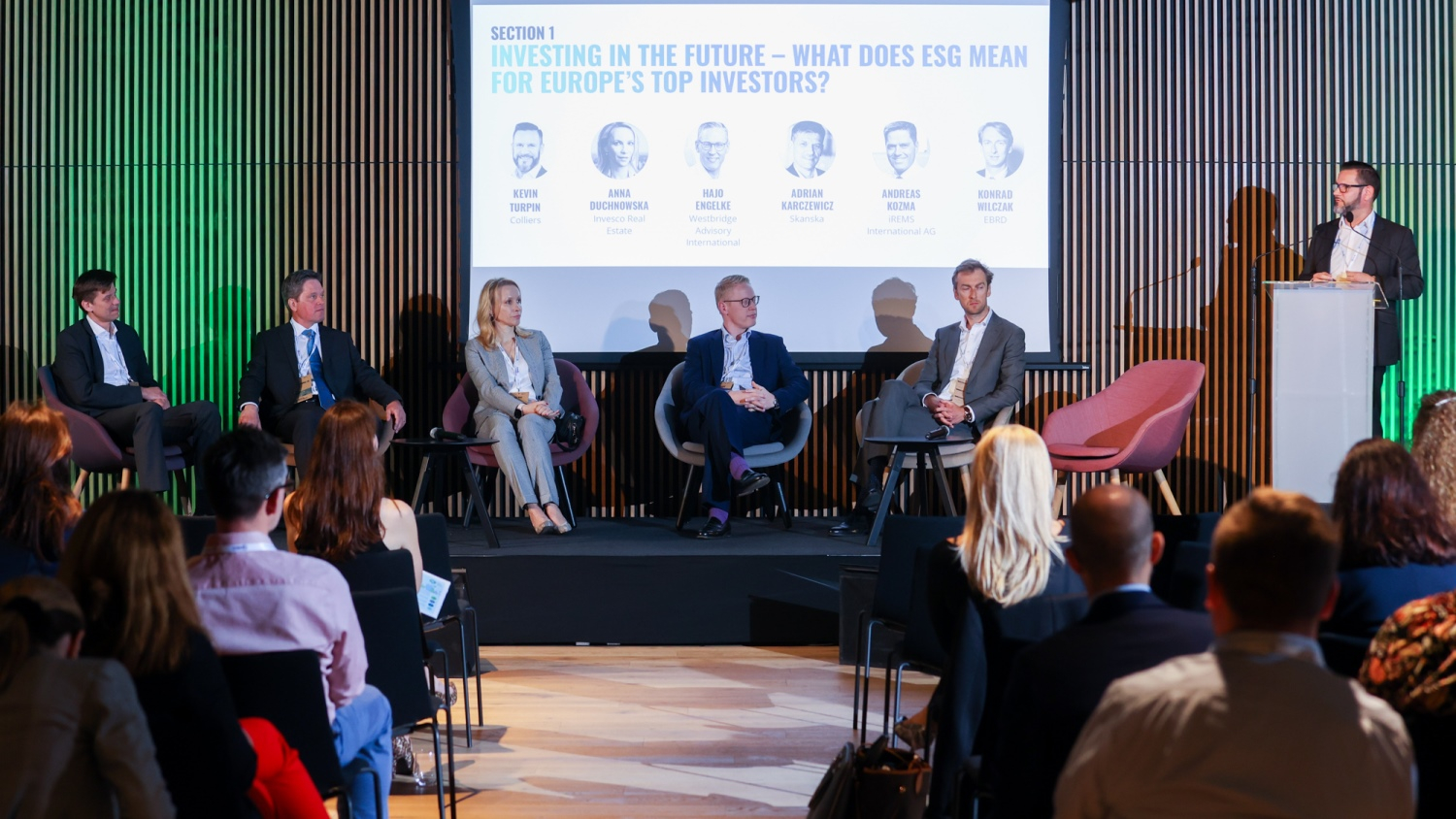
Data is key for the execution of a successful ESG strategy, according to the first panel discussion at the European ESG Property Forum conference in Warsaw where leading investors, bankers and advisors provided insight into the topic.
It is estimated that the property market is responsible for 40% of all greenhouse gas emissions with 30% of these being emitted during the construction phase and 70% being operational emissions. European stock is very far from being neutral in terms of carbon footprint. According to Kevin Turpin, Regional Director of Capital Markets for Central and Eastern Europe at Collierses, it is estimated that it would cost roughly between €5 to 7 trillion to bring all of Europe's real estate stock up to net-zero compliance. This process will take years, but in the face of climate change is inevitable. But where to start?
„I think that nowadays the development of an ESG strategy is still too much of a static process. It is developed and implemented without being very iterative. Because once you go into the implementation, you usually realize that strategy sometimes doesn't work and needs to be adjusted. Many ideas just look good on paper, but when you try to do it, sometimes things in real life turn out really different. In Westbridge, we strive to support our clients in the implementation of ESG strategies, but we also give them a lot of feedback – all of this in order to make it effective and have a real impact,” said Hajo Engelke, Managing Director at Westbridge Advisory International.
The discussion participants pointed out, that the key to a successful implementation of ESG principles is hidden in the proper use of the gathered data. “The data is sometimes handed over on the very low level of the organizations – IT departments, property management and so forth. The data silos have no connection with key players, the decision-makers. The data really should be enriched and entered into the system again, but on a completely another level - I'm not saying nothing is happening, but I could imagine that it would be more beneficial if handed over properly. We know that ESG is not just an additional cost or just an annoying item on the agenda. It really can be a transformative way of thinking but that hopefully makes life better for us and for our kids and grandchildren,” stated Andreas Kozma, Founder & CEO of iREMS International AG.
His opinion on the improper use of the data was shared by Anna Duchnowska, Managing Director – Investment Management, Europe at Invesco Real Estate: „The implementation of the ESG strategy should be a major part of the investment strategy and it should be held by the top management or at least the investment committee. If the data stay in the property management or IT department, it's not going to fly through. Data is key. If you don't have it, you don't understand what is your starting point and how can you improve. We are the landlords of our properties, but we get 80-90% of the data from our tenants. So if you don't have the tenant engagement, the whole procedure doesn't work, because you can collect only 10-15% of the building data”.
But how to persuade tenants to pass their data? „There are some data protection issues in many countries, there is sometimes a suspicion - why do you need my data? What are you going to do with it? Is it going to be safe? But thankfully, many large, corporate clients started to implement their own ESG strategies. And they understand that by sharing and exchanging the data with their landlords they can improve their own ESG objectives,” added Duchnowska.
ESG sensitivity is also more and more often considered a mandatory condition in asset purchase procedures. “We have recently sold Nowy Rynek D in Poznań for €121 million to Eastnine AB. They have been looking for ESG compliant assets and have been checking very carefully the aspect of energy efficiency. The company has secured the financing by issuing green bonds, so they couldn't buy anything else. Another interesting factor is the tenant – 80% of the building is leased to Allegro, which has a very strict ESG strategy itself. So, you can see the puzzle here,” said Adrian Karczewicz, Head of Divestments CEE at Skanska.
“We have a very specific ESG due diligence checklist, which is separate from the ‘regular’ due diligence examinations. And we are very strict on that checklist. Simple question - if the particular building doesn't have at least BREEAM “Excellent” certificate, we will not look at the asset, no matter how attractive it is, no matter in how good location it is,” added Anna Duchnowska.
“Three or four years ago, when performing due diligence, in the end, we were ordered by the customer to ‘check these three ESG items and do something about them’. Now, we are ordered to start with the ESG issues. If a certain ESG level is not reached in the building, the whole due diligence process is aborted." commented Andreas Kozma.



